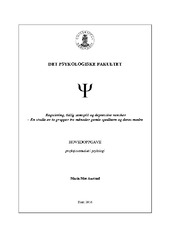Regulering, tidlig samspill og depressive vansker - En studie av to grupper tre måneder gamle spedbarn og deres mødre
Master thesis
Permanent lenke
https://hdl.handle.net/1956/15544Utgivelsesdato
2016-12-14Metadata
Vis full innførselSamlinger
- Faculty of Psychology [521]
Sammendrag
Problems with self-regulation is often the core symptom of many mental disorders. It is therefore important to have more knowledge about the factors that have influence on the early development of self-regulation. The overall aim of this study is to examine infant regulatory capacity and factors related to infants' dysregulation in interaction with their mothers. The study includes two groups of mothers and their three months old infants, a risk group with mothers referred to mental health services for mental health problems in pregnancy (n = 22) and a comparison group with mothers not reporting such difficulties (n = 30). Results show that the mothers in the risk group had higher scores of anxiety and depression in pregnancy, and more depressive symptoms three months after childbirth. The infants in the risk group had lower birth weight and were more dysregulated in interaction with their mothers at three months. Mothers' negative affect and behaviours during social interaction and infants' birth weight were significantly associated with infant dysregulation in interaction with their mothers at three months. The results point to the importance of early intervention for vulnerable mothers and their infants, and the importance of treating maternal depression already in pregnancy and also to offer parent- infant interaction guidance after the infant is born. The Window of Tolerance model can be a meaningful tool in the effort to increase parental sensitivity to the infant's needs and signals. Manglende evne til selvregulering er ofte kjernen i mange psykiske lidelser, og det er derfor viktig å vite mer om hvilke faktorer som påvirker den tidlige utviklingen av selvregulering. I denne studien er det overordnede formålet å undersøke reguleringskapasitet og de faktorene som henger sammen med spedbarns dysregulering i samspill med sine mødre. Studien omfatter to grupper av mødre og tre måneder gamle spedbarn: en risikogruppe der mødrene var henvist til psykisk helsevern for psykiske vansker i svangerskapet (n = 22) og en sammenligningsgruppe der mødrene ikke rapporterte om slike vansker (n = 30). Resultatene viste at mødrene i risikogruppen hadde høyere skåre på angst og depresjon både i svangerskapet, og depressive symptomer tre måneder etter fødsel. Spedbarna i risikogruppen hadde lavere fødselsvekt og var mer dysregulerte i samspillet ved tre måneder. Mødrenes samspillsstil var preget av negative affekt og atferd, videre hadde spedbarnas fødselsvekt en signifikant sammenheng med spedbarnas dysregulering i samspillet. Resultatene peker på betydningen av tidlig innsats for sårbare mødre og deres spedbarn. Det vil være viktig å behandle mors depresjon allerede i svangerskapet og etter fødsel tilby samspillsbehandling. Som en hjelp i arbeidet med å øke foreldrenes sensitivitet overfor sitt barns behov og signaler kan toleransevindumodellen være et meningsfullt hjelpemiddel.
